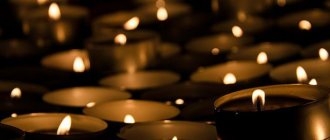- Comments:
Mourning, ritual speech is of particular importance in funeral rituals in Western countries. Civil memorial services are also held in Russia. In the process of mourning events, the central place is occupied by the farewell ceremony, the main element of which is also the funeral speech. Its goal is to create an atmosphere of solemn farewell, to convey to the people who came to say goodbye the main, positive information about the life path of the deceased. Usually, a funeral speech contains descriptions of significant events in the life of a deceased person, important memories about him, about the key traits of his character, about his lifetime achievements.
View a funeral speech template or View examples of funeral speeches
Thus, for people who know little about the deceased, his figure is revealed from new sides, the appearance of a person who lived a rich life is revealed. A well-written funeral speech at a funeral can greatly alleviate the severity of the mental state of relatives and friends. For example, church funeral services and prayers for the deceased have a similar psychological effect. For believing relatives, it is especially important to hear as many warm and pleasant words addressed to the deceased as possible. Since it is traditionally believed that this facilitates the state of the soul of the deceased in the afterlife.
Orthodox funeral according to church canons
Seeing off the physical shell is an important stage that allows relatives to say goodbye to a loved one, and the soul of the deceased to move on to another world. Funeral arrangements must be made accordingly. Rules for burying a relative, taking into account Orthodox canons:
- Unction of the dying person is performed before death;
- confession and the sacrament of communion are performed;
- the body is prepared, this is a multi-stage process that includes washing, dressing the body, embalming, applying makeup, positioning ritual paraphernalia next to the deceased;
- The funeral service is performed;
- the things of the deceased are not touched;
- cleaning of the house is carried out after the removal of the coffin, and relatives should not participate in these processes;
- burial takes place on the third day after death;
- immediately after the funeral, relatives and friends of the deceased go to the wake.
Relatives at the funeral
Other beliefs
There are also lesser-known funeral signs that are followed in villages. Among them, the following customs should be highlighted:
- In order not to be afraid of the deceased person, they touch his legs. This ritual is associated with the belief that death is in the head.
- The fear of the dead man has shackled him - pull the thread from the shroud.
- In the presence of the deceased, one should greet with a nod of the head, and not with words.
- The straw on which the deceased lay must be burned.
According to tradition, on the third day the bed of the deceased is taken to the chicken coop. There is a superstition that roosters, by crowing, drive away evil spirits and restless ghosts.
The presence of children and animals in the same room as the deceased should be limited. Otherwise, death may call them with it.
According to signs, the first person to be buried in the new cemetery will belong to the Devil. Traditionally, the first to be buried in the graveyard are those who were guilty during their lifetime.
How to say goodbye to the deceased in the first 3 days
There are certain prohibitions in people’s behavior after the death of a loved one; violating them can jeopardize the health of those living on earth and interfere with the natural transition of the incorruptible shell of the deceased to another world. Before the funeral, during the procession and after it, relatives must carefully monitor their actions.
Do not take out the coffin on the third day until 12 o'clock and at sunset
Recommended burial time is from 12 to 14 noon. A morning funeral symbolizes the rush of relatives to send the deceased away from home, which could cause another death. After 2 pm it is better not to stay in the churchyard. The closer it is to evening, the greater the likelihood of being exposed to dark entities from the afterlife. Funerals are prohibited after sunset, and the cemetery gates are already closed at this time.
Close the mirrors and stop the clock
Reflective surfaces should be covered with canvas or turned towards the wall. Causes:
- the spirit of the deceased can be reflected in mirrors;
- the imperishable shell will be lost in the looking glass;
- The border between worlds becomes thinner after death, which can lead to the appearance of otherworldly entities at home.
In addition, the clock must be stopped. This is a show of respect for the deceased, which symbolizes the completion of a life stage on earth. Such customs came into our lives from ancient times, when people believed in pagan gods. But the church condemns such behavior.
Closed mirror
Greeting with just a nod
The soul of the deceased remains at home among loved ones until the third day. Those who come to the funeral should behave calmly; instead of the traditional greeting, a nod of the head is recommended. You should speak in a whisper, you cannot laugh. This behavior is due to the manifestation of respect for the deceased.
Express condolences to relatives
Words of support are expressed to close relatives of the deceased (family members). Condolences should be brief but sincere. One should not hint at the guilt of relatives and lack of care towards the deceased or look for the reasons for his death in behavior during life. It is necessary to express the hope that the soul will be in a better place and promise to pray for it.
It is customary for Muslims to offer condolences to the relatives of the deceased during the first three days, but not later. The custom has a specific name - tazia. In Islam, there is a prohibition against long-term grief, so support provided by loved ones through words of condolences at the wrong time is considered a violation of the rules of the Koran.
Expression of condolences
Prohibited behavior at a funeral
Many people do not know how to behave at the funeral of a relative. At the same time, some errors in behavior are obvious, while others, on the contrary, are implicit:
- to speak badly about the deceased: there are different reasons, first of all, you need to pay tribute to the deceased, but at the same time they strive to take care of his soul, pray, remember pleasant moments, you also need to list good character traits so that righteous deeds are counted in heaven, the Lord has forgiven his sins;
- clean up, take out the garbage: before the funeral you cannot throw out garbage, wash floors, sweep surfaces, removing litter, this can contribute to another death among family members;
- sleep in the house with the deceased: it is necessary to stay close to the deceased day and night to show how loved ones support him, but you cannot sleep, because the soul of the deceased can move into the body of the sleeping person, will look for a way to return to the world of the living, loved ones still dream nightmares under such conditions, which is caused by the fear of being near the body, as well as great stress due to the loss of a loved one;
- turn on the TV or music: you should not disturb the soul of the deceased, relatives observe funeral etiquette - they avoid sources of loud sounds, this is how they show their respect for the deceased, another reason to be in silence or turn on the TV more quietly, music - the need to survive grief, no need for entertainment ;
- leaving the coffin in an empty room: dead flesh is the focus of the energy of death, it is used to cause damage to illness, death, etc., you cannot leave the deceased alone at home before the funeral, they can put a photo or things of a living person in the coffin, or perform another ritual, and the soul of the deceased may feel loneliness, its uselessness to relatives;
- pouring tears into the coffin: the soul of the deceased feels the grief of loved ones, suffers, seeing them in this state; if tears of relatives fall into the coffin at the funeral, the burden of the incorruptible shell will become even heavier in the other world;
- kiss a deceased person on the lips: there is an opinion that the soul of a deceased relative can enter the body of a living person with a kiss on the lips, but this is an old pagan misconception based on assumptions and fears; in those days no one could know that the soul leaves the body immediately after death, today this ban is explained by a violation of hygiene rules.
At the funeral of a suicide, it is not customary to loudly show grief, just as you should not kiss the deceased on the forehead, much less on the lips. A person who commits suicide has renounced God, left the Christian faith, and is considered defiled. A light touch to the body of a deceased relative after death is enough.
Farewell to the deceased
Keep the fire going while the deceased is in the house
A candle flame is a symbol of gracious love for the Lord. Relatives should behave carefully: they should not allow the fire to go out at home. Previously it was believed that it should burn until it goes out. Sometimes the flame was kept on for a year, but in earlier times the source of fire was a fire pit or a kerosene lamp. Today, it is enough to place a lit church candle where there is no draft. The flame must burn until the coffin is taken out of the house.
Turn over the stools on which the coffin stood
There are many superstitions associated with funeral furniture:
- it is necessary to turn over the stools, because they contain negative energy;
- if you sit down on a seat immediately without completing the ritual, it is believed that such a person is giving/giving away his energy to the dead man, and in the future he will have to replenish it, which is fraught with illness.
Esotericists also express opinions regarding the use of stools. They are turned over so that no one sits down immediately after the coffin is taken out. This can tie the living to the dead, as a result, vital energy will flow away, and with it the good, which is fraught with troubles, failures, and illnesses. After 72 hours, the chairs are returned to their original position.
Burial ceremony
Throw away everything associated with the deceased after removing the body
When relatives say goodbye to the deceased before the funeral, you need to behave correctly to avoid the effects of negative energy. After the coffin is outside the home, throw away everything that was purchased specifically for the funeral or used during the preparation of the coffin: flowers, a piece of fabric, items given to the deceased and items purchased personally for him, as well as wood chips that flew off during the preparatory work .
Wash the floor after removing the coffin
After the death of a person, the energy of death is concentrated at home. It will negatively affect family members, so you need to wash the floor after removing the coffin. Moreover, the direction of movement was determined in advance - from the corners and door to the center of the room where the coffin stood. Another sign: washing the floors helps protect the house from the spirit of the deceased. He won't be able to return.
After washing the floors, you also need to behave correctly, for example, it is important to throw away the items that were used during cleaning (broom, rag, bucket). Moreover, “dead” water is poured where no human or animal has ever set foot. You can also leave things here, having previously broken them so that no one can use them. An alternative option is burning.
Washing the floor after removing the deceased
The meaning of funeral paraphernalia
For an ordinary person, the funeral procedure is a tragic moment of saying goodbye to a loved one. For people close to the world of black magic, this is nothing more than an opportunity to solve their own or someone else’s problems of a magical nature. A lot of signs are associated with the fear of the negative impact of a witch or sorcerer. Relatives did everything to ensure that black magicians did not take possession of the attributes of the funeral ceremony. These items included:
These items are used by sorcerers and witches to inflict deadly damage. Therefore, it is customary to pour water from under the deceased into a pre-dug hole as far as possible from the house. All things used in washing and preparing the deceased were usually placed in the coffin. It was also customary not to leave the deceased alone in the house. This was explained by the fact that the witch, at such an opportunity, would definitely make a lining in the coffin - a photo of the alleged victim or something belonging to her. This is nothing more than damage to death. Therefore, strangers were not allowed to approach the deceased at the cemetery, especially if they behaved suspiciously.
Strange behavior could be as follows:
- desire to lie on a dead man's bed;
- a man tries to go out behind the coffin with his back facing forward;
- weaving knots on a cord, rope or rag at the moment when the deceased is carried out;
- placing needles crosswise along the lips of the deceased.
Modern people are skeptical about the possibility of harm from adherents of black magic, especially with the help of certain objects. But there are too many cases that directly confirm the effect of evil spells. One of the most popular ways to get rid of a person is to put a photograph of him in a coffin, or even better, in the mouth of the deceased. And this is just one of many methods of causing damage. Despite the grief, you need to carefully watch what is happening around you. Anyone can commit negative actions.
There are mainly bad omens associated with the dead. And here the reason is not only the fear of death - there is also fear of the deceased. After all, just recently he was alive, and now he has moved to another world. Following all signs and traditions should ensure an honorable and comfortable farewell to the deceased.
Farewell service in church
The Church teaches that the soul of the deceased cannot intercede for the forgiveness of his sins. This is done by relatives and clergy. It is important to behave correctly in the temple before the funeral, when the service is being performed. Otherwise, you can nullify the entire power of the ritual. Recommendations:
- how to pray correctly: they say a prayer together with the clergy, but this can be done by churchgoers or those who often read the prayer book at home (the spoken texts are familiar, like the Old Church Slavonic language), turn to God sincerely, with all their hearts, without misleading themselves and Almighty;
- handkerchiefs for candles: funeral gifts are often distributed to all those present, usually these are handkerchiefs, but in some regions similar things are given at the end of the funeral ceremony, the function of handkerchiefs is to wipe away tears, prevent burns from the flowing hot wax of candles;
- cover your head with a scarf: in Christianity, since the time of the life on earth of the Son of God, girls and women covered their heads with a scarf, this is still considered correct, especially if the relatives of the deceased came to say goodbye to him in the cemetery, the scarf symbolizes purity, humility, fidelity - to her husband, family , Christian faith, without it women should not attend temple;
- church about expressing sadness: when they come to a funeral, not everyone knows how to behave correctly, one must show restraint, the Orthodox faith prepares church parishioners for Eternal life in the Kingdom of Heaven, which means that strong grief will show how close ones are (grandparents, mother, dad, husband, etc.) are selfish, because they do not care about the soul of the deceased, but about themselves - they experience their own pain.
Funeral service in the church
Mourning etiquette at the cemetery: how to properly say goodbye to the deceased at the coffin
Sometimes conflict situations arise at funerals and after them, the reason being the inappropriate behavior of some who came to the farewell ceremony for the deceased. You need to know what you can wear, how you should speak, and behave in other cases.
Dark outfit, black headdress
Mourning clothing is a way to show respect to those present, as well as to the deceased. This allows you not to create an emphasis on appearance, but to focus on the event. In addition, black is a color that reflects the depth of grief of loved ones. Women are required to wear a headscarf or headband. Men, on the contrary, are not recommended to wear a hat. They show grief by wearing dark clothes.
Photo and video filming of the funeral procession
Today, many people have gadgets, modern technology: smartphones, SLR cameras with special lenses, etc. But you should not take it with you. First of all, it will distract from the event. Constant calls also disturb others and relatives of the deceased. You cannot behave disrespectfully, and constantly photographing a deceased person or grave is considered a manifestation of this. Moreover, you can even harm yourself this way, because the pictures will carry negative energy.
Family in mourning clothes at a funeral
Rules for saying goodbye to a cemetery
It is necessary to understand how to behave correctly at a funeral during the procession of the last farewell:
- the deceased is kissed: on the forehead (crown), some prefer to touch the hand, but the first option is more hygienic, since you do not have to come into direct contact with the body;
- after the farewell procedure, handkerchiefs or money are distributed to those who come;
- the ropes are removed from the limbs of the deceased, they should be left in the coffin, and this is done in such a way that after that no one else will approach it, the lid is clogged;
- throw 1 handful of earth into the grave.
It is important to understand how to say goodbye to the deceased - in what order to approach the grave.
The first to be admitted are immediate relatives (mother, father, husband, etc.), then a friend, acquaintance, or colleague can come up.
Farewell speech. Examples of farewell words
Nobody teaches the rules of farewell at a funeral in advance, because often this event happens suddenly. But there are unspoken customs that are usually supported. When attending a funeral, saying goodbye should say a few words over the coffin. Example phrases:
- “Rest in peace, (name)”;
- “Goodbye, (name)! The memory of you will always be with me";
- “The deceased is given eternal peace, and the living are given patience to survive this unfortunate event”;
- “May your soul rest in peace! I will pray for her."
Silence during a minute of silence
One of the formats of farewell is silence at the coffin at a funeral before burial. If a master of ceremonies has been invited to conduct the ceremony, those who come will be informed when the “minute of silence” will begin. During this short period, no one should disturb the silence. This is how they honor the deceased. Then those who say goodbye can go to the wake.
Laying flowers
You cannot leave flowers inside the coffin. They are removed before the lid is nailed down. When the grave is buried, those who came to the funeral can lay flowers on the earthen mound. To honor the memory of the deceased, bouquets of a certain type and color are presented (depending on the gender and age of the deceased). But, according to the traditions of Orthodoxy, there must be an even number of flowers:
- color for a woman: tulips, roses (and light, delicate shades) are suitable for a girl, yellow flowers, often roses, for a dead middle-aged woman, chrysanthemums, carnations for the elderly;
- color for a man: they often bring wreaths and bouquets to the grave, decorated in cool shades (blue, lilac, dark blue), the flowers can be any, preference is given to irises, calla lilies are also in demand (preference is given to varieties of elongated buds), it is permissible to present the deceased with burgundy roses are a universal option.
You can't walk along other people's graves
You should not walk through the cemetery or visit other people's graves, as this is how a person shows disrespect for a deceased relative. It is also believed to disturb other dead people. In addition, the cemetery is a center of negative energy; walking here can be dangerous for a person who is particularly sensitive and susceptible to external influence.
People at the cemetery
Purification ritual upon leaving the cemetery
Rules of behavior at a relative's funeral usually include recommendations on what to wear and say, and describe the sequence of actions during the burial. But you won’t be able to find out how to cleanse yourself of the energy of death after a cemetery. You need to study ancient traditions:
- Having said goodbye to the deceased, you cannot look back when leaving the graveyard;
- when entering a house, they take off the shoes they wore to a relative’s funeral;
- you need to wash your hands, or better yet, take a shower;
- They warm their limbs over the flame of a church candle; it is generally believed that this way one can ward off the cold of death.
Actions of relatives after death
After cardiac arrest, the deceased must be immediately washed and dressed in fresh clothes so that he appears clean before the Lord. Unmarried girls are usually dressed in a wedding dress. Be sure to put a cross on the deceased. The body can only be washed by women who have become widows.
After the death of a person, the windows and doors in the house are opened, including the gates, so that those who wish can come in and say goodbye to the deceased, as well as to facilitate the departure of the soul of the deceased .
Immediately after this, you should stop the clock in the house and cover mirror surfaces. They must remain in this state for 40 days. In the room where the deceased lies, you should not greet with words, but simply nod your head to the person who comes. You can walk around the coffin with the deceased only at its head, while bowing to the deceased. Friends bring a bouquet with an even number of flowers to wish them prosperity in the next world.
On the threshold of the house, relatives should place several spruce branches so that people who come to say goodbye to the deceased do not carry misfortune into their home.
Pets should not be allowed into the room where the coffin with the deceased is located, so as not to frighten his soul.
Household members should not start cleaning, take out the trash, wash the floor or sweep, even if one of the relatives spilled or spilled something through carelessness, until the body is taken out of the house.
While the corpse lies in the room, there should be a glass of clean water on the windowsill: it is believed that in this way the soul of the deceased person is cleansed.
Why are the hands and feet of the deceased tied?
According to folk superstitions, the deceased’s hands and feet are tied a few hours after death in order to “tie” the soul to the lifeless body and so that it does not wander around this world in the form of a ghost. Just before burial, the shackles must be untied in order to free the soul of the deceased.
There is also a logical explanation for tying the legs and arms of the deceased: the body cools down after death, rigor mortis sets in, and the muscles can shrink, so the limbs are frozen in unnatural positions, which does not correspond to the correct position of the body of the deceased during the funeral procession.
According to tradition, the hands of the deceased should be folded on the chest. A wax candle is inserted into them.
The legs should be extended and pressed against each other.
How to take a coffin out of the house?
It is forbidden to remove the coffin before noon and after sunset.
It is important to know: the coffin with the deceased should be carried out feet first, so that the deceased does not find his way back home.
This is done through the back door, and if there is only one exit in the house, you should hit the coffin on the threshold three times to give the deceased the opportunity to say goodbye to his home. While the corpse is near the house, you need to lock the door and say: “Get out of the house, dead man, go away alone and don’t come back!”
The deceased is not allowed into the house - you need to sprinkle water on the floor, and after removing the body, thoroughly wash the floor with clean water. The chairs or table on which the coffin stood should be turned upside down and left in this position for the whole day.
The coffin with the body is brought into the church for the funeral, feet first, and placed facing the altar (head to the west, feet to the east).
“Question-answer” section
How were the funerals of those who died from coronavirus?
Expert opinion
Krivosheeva Lyudmila
Pathologist
When the number of people infected with a dangerous infectious disease increases, it is necessary to limit contact with its source. Coronavirus patients are isolated even after death:
- buried in special bags;
- the coffin must be closed;
- relatives bidding farewell to the deceased at a funeral is not welcome - kissing is prohibited;
- The funeral service is not carried out in the traditional way; the clergyman is invited to the graveyard.
How is the urn with ashes buried?
Expert opinion
Gennady Gennadievich Lopyrev
Director of a funeral agency
Cremation simplifies the burial procedure, but it makes it more difficult for relatives to say goodbye to the deceased, which is especially important if a beloved loved one dies. It is important to find out what behavior should be at a funeral after the crematorium, when the ashes are buried:
- it is important to pick up the urn with ashes on time, it is stored free of charge in the crematorium for up to 40 days, then a fee is charged, it is more realistic to do this in 3-5 days, which is due to bureaucratic delays;
- with a standard burial, the procedure is the same as in the case of burying a coffin: the grave is prepared, but much less than usual, farewell to the deceased is arranged, flowers are laid.
Burial of an urn with ashes
What to do if you feel bad at a funeral?
Expert opinion
Lavrova Tatyana
Rehabilitation specialist, psychologist
We need to help someone who is feeling unwell. This should be done taking into account the symptoms. If you faint, you need to provide air access. When the person comes to his senses, you need to offer a glass of water. At the same time, it is important to give the person the opportunity to sit down or lie down (if those who came are still at home, saying goodbye to the deceased or have already returned from the funeral).
How to behave at the funeral of a friend who is not a blood relative?
Expert opinion
Lavrova Tatyana
Rehabilitation specialist, psychologist
The recommendations are the same as when attending a relative’s funeral:
- express condolences;
- You should not show strong emotions;
- It is recommended to offer assistance to relatives in organizing the funeral.
How to say goodbye to the deceased correctly at the coffin in a church and in a cemetery, is there a difference?
Expert opinion
Remontnikov Vladimir Petrovich
Religious scholar, historian
You can carry out the farewell procedure in the church and graveyard. In both cases, prayers are said over the deceased, one should behave in the same way: one must say goodbye to the deceased through a kiss, one must pray for him. Moreover, the most correct option involves the need for a funeral service in the church, followed by farewell at the coffin in the graveyard.
After death, a Muslim can be accepted by Allah after the ritual of atonement for sins (dawr), for this they allocate a certain amount and distribute money to the poor.
Funeral of the deceased
How to say goodbye to the deceased at a funeral if it is a grandmother?
Expert opinion
Father Pavel
Clergyman
Prayers are read over the body. After the end of the service, which is performed by the clergyman, they kiss loved ones. In this case, you need to behave as calmly as possible, so as not to shed tears into the coffin. This leads to illness and an increase in the burden of the soul. The rules for saying goodbye to different relatives are the same, be it a grandmother, a husband or a son.
Important points
All verbal condolences should be short in form.
- It is more delicate to express official condolences in writing. For this, a heartfelt verse is more suitable, to which you can choose a photo of the deceased, corresponding electronic pictures and postcards.
- Personal individual condolences must be exclusive and can be expressed either verbally or in writing.
- For the dearest and closest people, it is important to express or write sorrowful condolences in your own sincere words, not formal, which means not stereotyped.
- Since poems are rarely exclusive, exclusively yours, so listen to your heart, and it will tell you words of consolation and support.
- Not only words of condolences should be sincere, but also an offer of any help that is within your power: financial, organizational.
Be sure to mention the distinctive personal virtues and character traits of the deceased person that you would like to preserve in memory forever as an example: wisdom, kindness, responsiveness, optimism, love of life, hard work, honesty...
This will be the individual part of the condolence, the main part of which can be formulated according to the approximate model proposed in our article.
Behavior at a wake
In order for relatives to say goodbye to the deceased, they need not only to bury him, but also to organize a wake. This rule cannot be broken, the exception is the burial of homeless people, who are taken from the morgue directly to the cemetery, most often there is no funeral service, no one remembers them later. Basic recommendations for organizing a funeral:
- t is a traditional funeral dinner: they prepare kutya, pancakes, pies, jelly, first and second courses, salad, no sweets are placed on the table;
- express words of sympathy: the wake begins with a minute of silence and saying prayers, then they begin the meal, first everyone should try kutya, you can also express condolences if you were unable to seize the moment earlier;
- do not stay too long: the average duration of a funeral meal is 1.5 hours; if it lasts longer, it gradually turns into a feast;
- do not drink alcohol: relatives should not drink alcohol, it harms them, as well as the soul of the deceased - it awakens base feelings, desires, increases lust, thereby increasing a person’s sin, his attachment to the earth through pleasure;
- accept funeral treats for the family: when attending a wake, you cannot refuse treats that are distributed closer to the end of the meal, these can be sweets, pies, so relatives and friends can once again remember the deceased.
In some regions, it is customary to distribute additional spoons after a funeral. This is a symbol of memory of the deceased.
Funeral table
Universal mournful texts
- “May the earth rest in peace” is a traditional ritual phrase that is said after a burial has taken place; it can be used as a condolence at a funeral service; it is suitable even for atheists.
- “We all mourn your irreparable loss.”
- “The pain of loss cannot be expressed in words.”
- “I sincerely condole and sympathize with your grief.”
- “Please accept my deepest condolences on the death of a dear person.”
- “We will keep in our hearts the bright memory of the deceased wonderful man.”
Help can be offered in the following words:
- “We are ready to share the severity of your grief, be by your side and provide the necessary assistance to you and your family.”
- “Surely, you will need to resolve many issues. You can count on us, accept our help."
Magic rituals at funerals
Sorcerers and simply people with bad intentions can perform strange actions that allow them to influence the behavior, thoughts and feelings of other people:
- tend to lie on the bed of the deceased;
- asking for the deceased’s sheet for themselves;
- they take the ropes from the coffin, which were used to bind the deceased in the coffin;
- they chop off the lips of the deceased, after which the needles are taken away;
- they take grain from a glass with a candle, “dead” water that was used to wash the floor at home after removing the coffin, and replace the personal belongings of the deceased.
Father's comment
Father Vladimir
Clergyman
When organizing a funeral, you should rely on the canons of Orthodoxy; it is recommended to ask the priest or your confessor for advice. Previously, they grieved openly, this allowed them to pour out the pain and accept the death of a relative. But today the standards of decency deny this possibility. The religious view on this issue is somewhat different: grief must be lived through, one cannot withdraw into oneself, moreover, strong grief leads away from God, because at this stage a person mourns not the deceased, but himself. Jesus Christ also cried after the death of a friend, but not because of the loss, but out of compassion for his grieving relatives. This means that you can grieve, but you need to remember that death is part of life, just a stage of transition.
Approximate sequence of speech:
- the speaker introduces himself, says who he is related to the deceased;
- expresses grief over the event;
- lists the most important deeds or achievements of the deceased;
- talks about positive personality traits;
- gives several vivid life examples, recalls any joyful moments;
- concluding his speech, he emphasizes that the deceased will always be remembered.
The main condition is not to give the speech a gloomy mood, to make it solemn.









